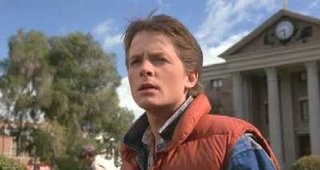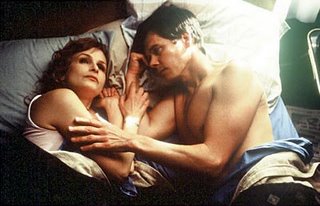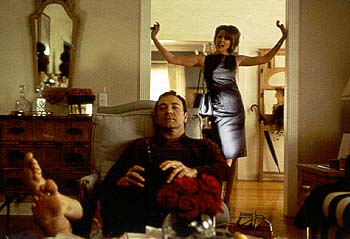Ya know, the discussion about flashbacks became so lively, I think the fairest thing to do is to pubish the comments of those who disagree, particularly Lori's. She deserves to be heard.
said...
Okay I hear you, and generally agree with you. But I think we can debate a bit more the flashback technique and 'where' you pull the flashback from. Take 'The Usual Suspects' (another Oscar winner) --- begins with explosion on boat and 'someone' approaches Keaton (Gabriel Bryne) and shoots him (with a little misdirect as it's shot as if someone else is watching them).Because the mystery was still intact (who is Keyser Sose?), the ending wasn't ruined. Could the story have still been told without the opening? Sure...I suppose - but it worked as it was.Now if the teaser opening had been Verbel leaving the copshop and transforming into Soze, that would have been a bad place to pull the flashback from... am I making any sense?And American Beauty could have been told without opening info, but as it was, the movie went from 'what will happen? will he die? ...to ... what will happen? how will he die (does someone kill him?)? It still feels like an either/or scenario...Historical stories can also get away with it (like Titanic) since most of us know the ending already. The filmmakers are simply choosing to give that story a particuliar perspective.But I'm still with you as a general rule.
July 12, 2006
Mickey Lee said...
I had to think long and hard for a comment on this one. You bring up many good points. And it's very tough for me to defend flashbacks because I generally despise them and never use them in my own writing. However...Movies that start with the ending are essentially just asking a different question then movies that play from beginning to end. Instead of asking "what's going to happen?" they ask "How's this going to happen?", which I think is completely legitimate. Any biographical film (i.e. Titanic) asks this question regardless of whether they show the ending at the beginning or not, because we already know how it's going to end.Having the ending at the beginning, i.e., "American Beauty" and "Sunset Boulevard", does one more service to the filmmaker. It softens the blow of a "Down ending." The audience knows from the get-go they are watching a tragedy. No test audience can fill out their cards saying "the movie was great, just wish the good guy got away at the end." Shakespeare didn't call "Hamlet", "Hamlet". He called it "The Tragedy of Hamlet, Prince of Denmark," essentially giving us the ending at the beginning. The Globe audience knew from the beginning that Hamlet was going to die, it was HOW he was going to die that mattered. But Shakespeare could pull it off.So the problem, I think, is not one of structure but of skill. "WHAT" is much simpler to pull off, because all you do is withhold information. It's the easiest kind of suspense. "HOW" is much tougher. When the audience knows the main character is going to die, they formulate thousands of stories in their head leading to that ending. The writer needs to surpass all those stories in order to be successful. Very few writers can pull that off.My two cents, and believe me, it was hard to do because I hate flashbacks generally.
July 12, 2006
said...
Mickey:Nicely put - and I think we are saying more or less the same thing (how instead of what), no?
July 12, 2006
Mickey Lee said...
Yeah it looks like it! Sorry, I actually didn't read your comment until after I posted mine. Could've saved me some wear and tear on the old carpals.Cheers
July 12, 2006
said...
Hey, guys, I truly appreciate these comments. I'm going to blog more about this in a day or two, because, ya know, I thought of some great movies worthy of discussion.You guys made me think that not only could that type of structure place an emphasis on HOW but maybe even WHY?-MM
July 12, 2006
mickey lee said...
I was thinking the same thing when I wrote my initial comment. But I could not think of a movie with a good "WHY?" set up, except "Citizen Kane." "Rashomon" occurred to me, but that's really a "HOW" movie.
July 12, 2006
said...
'Memento'...sort of
July 12, 2006
Lori Pieper said...
Hi, I'm immaginativa (writer of "The Marquise," and since my story has been the subject of some discussion here, I thought I'd join in. (I've already written Mystery Man some of what I've going to say). First I should correct a couple of things MM had to say about my screenplay, since some of his description of my story bears very little relationship to what I actually wrote. My screenplay may have some faults, but he’s making me out to be a much clumsier writer than I really am. Here’s what he said:“By showing us in the beginning that the Marquise lived to be old and was married to Larrieux who died, you gave away the whole ballgame.” The marquise does not marry Larrieux at the end. He is described at the beginning of the screenplay as being “her one lover of long ago,” not her husband. It’s clear that they broke up long ago. “Before we even get to see a seducer like Bretillac in action trying to win her over, we already know that his advances will amount to nothing because she ends up marrying Larrieux.” I think what MM means here is that if Bretillac’s plot to seduce the marquise had succeeded (it was actually an attempted rape that he was going to make look like seduction) and she was disgraced because of it, and Larrieux had learned of it, that would have made him decide not to marry her – and therefore we know already B’s advances have to fail. But Larrieux doesn’t learn of it and doesn’t marry her – for other reasons. Once again there’s no connection between this and the ending. “We already know, when she was ill toward the end and worried about dying, that she will not die.”What MM is referring to occurs in the third act, after the marquis experiences a mild fever and is bled by a surgeon. There is absolutely no question of her dying. It leads to her passing out and a later fainting spell - that’s all. The incident does lead to some suspense - of whether she will be able to make her rendezvous with the actor Lelio and confess her love or not. (I’ve been told by some readers that this is quite effective). So this gives away nothing.That said, it’s pretty obvious I’m a fan of flashback structure. I agree with a lot of what Mickey Lee and wcdixon are saying. The common thread seems to be that having a beginning where at least part of the ending is revealed leads to a lot of possibilities for the screenwriter to engage our interest in other ways than by mere suspense about the outcome. It allows the writer to focus our attention something he or she considers more important.When skilled screenwriters use the flashback /VO method, they are careful not to give "everything" away. They may reveal a few things, but not the answer to the major dramatic question of the movie. In fact’s what’s revealed (or not) will often reveal what that major question is. Here’s a terrificexample from one of my favorite films -- "Amadeus." The very first words of the film are Salieri telling us he killed Mozart and asking Mozart to forgive him. That certainly gives away a lot!BUT several major things are left unsaid: for one thing, Salieri’s motive, which is gradually and brilliantly revealed throughout the movie. But there’s more. To me, the major dramatic question - the answer to which we don't find out until the film's final moments -- is whether Salieri realizes that he himself needs forgiveness from God. All throughout the film, the forgiveness motif has been very strong - I don't think the audience can miss it. And Salieri continues to resist divine forgiveness (so beautifully expressed in the “Marriage of Figaro” music). But his remorse in regard to Mozart leads us to think he might actually go himself to the source of forgiveness. But at the very end he slips back into his madness and his sin - apparently forever. I thought this was utterly brilliant. I’m sure that Peter Schaeffer, the screenwriter of "Amadeus" chose this beginning and this method deliberately. (And then in regard to the "murder” he even has a surprise in store - Salieri doesn't physically kill Mozart, but he feels morally responsible for his death).Now, in regard to my screenplay, what I was reaching for was exactly what MM said: the marquise’s need to find a generous and noble man - and more than just that. What she needs most is not just to be with such a man, but to know that this kind of goodness exists. It’s bound up with another theme of the film, which is her loss of the presence of God in her life because of her traumatic experience with her husband, and her need to find it again. I was trying to make it clear that the two are connected: she needs to find the perfect ideal goodness that will satisfy her soul. Neither Lelio or any other man is going to wholly provide that. On one hand, as an actor playing ideal heroes, he is a representative of perfect goodness; on the other hand, if she tries to see the real man as perfect, she’ll be disappointed. She makes that mistake for quite a while, but does come to love the real man in the end, for his real, but imperfect goodness, and also gains an increased sense of God in her life, because of her experience of his ideal goodness on stage (I realize this is very confusing to those who haven’t read the story, but bear with me). So, in this story, which I adapted, by the way, from a novella by George Sand, I wanted to focus on this particular question very closely (so did Sand, evidently, because my structure more or less reproduces hers). So we DO learn early on that the marquise clearly didn’t end up with Lelio permanently. But what we don’t know is whether this is because she never stopped focusing on the ideal heroes and never saw the real man, or because he only saw her body, not her soul, like the other men, or because HE rejected her in the end because he thought she loved the heroes, not him -- or whether they loved each other, but society’s prejudice means that they can’t be together. But the dramatic tension is focused on the question of true love, not whether they stay together. After all, Romeo and Juliet found true love, but they didn’t get to grow old and enjoy their grandchildren together. And in fact, Shakespeare gave away the ending in practically the first words of the prologue of this play, so he must have wanted to focus on the true love question, or the question of fate, or the fact that the sacrifice of their lives would lead to peace, all which the prologue points to. I think the flashback technique actually helps to keep my major dramatic question clear - or should if I’ve used it right. Maybe that’s something we could discuss!Hope this has added something to the discussion.
July 12, 2006
Mickey Lee said...
LoriI personally have not yet read your script. So my comments were simply directed at the question MM posed at the bottom of his post. I actually skimmed over the stuff he posted about your screenplay because I haven't read it, so I never took his post as a discussion on your script, just a discussion on "framing" devices in general. I'm not a big fan of flashbacks -- I think they are vastly overused. While you are right to say that skilled writers can do great things with flashbacks (Amadeus is a great example), what I've mostly seen are weak writers using them as a crutch.I don't find enough people using flashbacks like you prescribe, as a way to underscore your themes. Rather, it's to give us unnecessary character development, exposition or just as a cheap way to create interest in a story that would otherwise not be interesting if told in order.A point that MM made which I strongly agree with is that the "Princess Bride" type framing devices create a distance between the audience and the characters, vesting more of our emotions in the storyteller rather than the characters which are supposed to delineate the theme. Not that any of this applies to you, because I haven't read you script! But there's my two cents. Hopefully I'll get assigned "The Marquise" soon!
July 12, 2006
said...
Good example in 'Amadeus' - and I'm in same boat as Mickey Lee in that I haven't read Lori's screenplay, but was just commenting on the flashback script...but a good discussion.
































